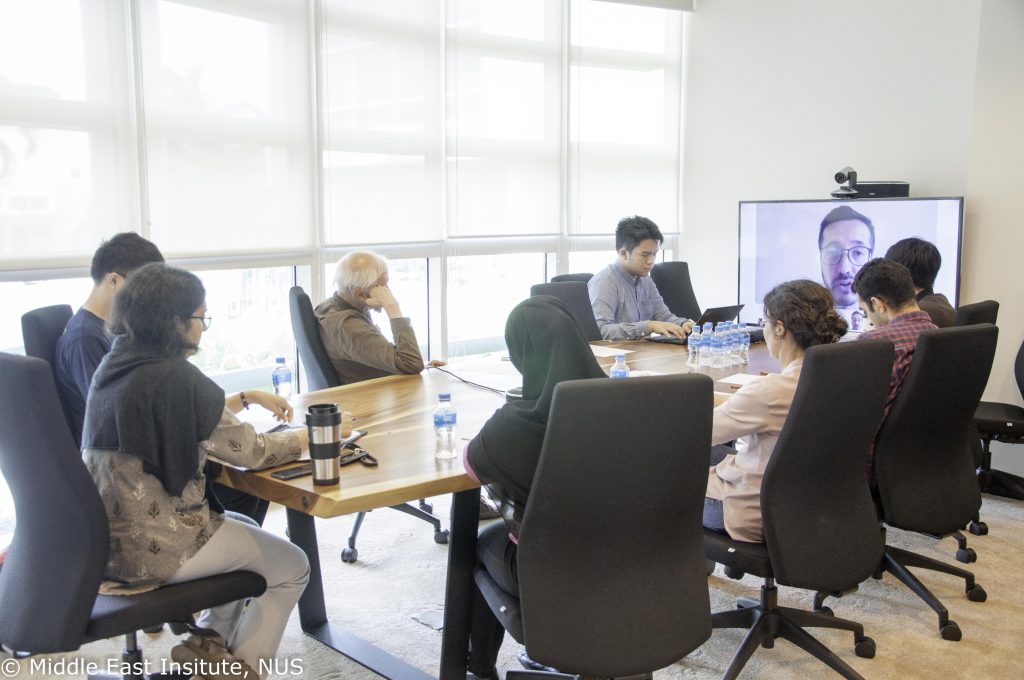Last week, MEI Research Fellow Serkan Yolaçan held an Arabia-Asia cluster seminar to discuss the role of the Gülen movement in the neo-Ottoman foreign policy of Turkey’s Justice and Development Party (AKP). Here is the summary.
Tigers-Turned-Traitors? The Business of Devotion in Turkish Foreign Policy
- - June 25, 2018

Last Thursday, MEI Research Fellow Serkan Yolaçan discussed the significance of the Gülen community in Turkey’s neo-Ottoman foreign policy under the Justice and Development Party (AKP). Arguing that analyses of Turkish foreign policy focused too frequently on politicians like Recep Tayyip Erdoğan and Ahmet Davutoğlu, Dr Yolaçan shifted the focus to religious leaders, i.e. Fethullah Gülen. Dr Yolaçan argued that while neo-Ottomanism was the brainchild of AKP’s Davutoğlu, its implementation was almost impossible without the Gülens community. Dr Yolaçan also posited that the failure of neo-Ottomanism as a policy coincided with the split between Erdoğan and Gülen in the early 2010s, which culminated in the 2016 failed coup attempt resulting in the mass purges of Gülenists within Turkish state institutions.
A Sunni Islamic movement centred around the charismatic Turkish preacher Fethullah Gülen, the Gülen community – also known as the Hizmet or the Cemaat – arose during the economic liberalisation era of the 1980s which saw the emergence of a new class of devout Muslim entrepreneurs, widely known as the ‘Anatolian Tigers’. The movement purports to advocate a modern and liberal version of Islam through interfaith initiatives and educating Muslims in the secular sciences.
With the goal of creating a ‘golden generation’ of pious and educated Muslims, the community established educational institutions and businesses in Turkey and around the world in the 1980s and the 1990s. In particular, the Hizmet occupied the institutional void in nominally Muslim new Central Asian states such as Azerbaijan, Kazakhstan and Turkmenistan following the collapse of the Soviet Union. These newly independent states also had the support of the United States which wanted to counter Iranian and Russian influence in these countries. Also, in spite of repression against Islamists back in Turkey, the secular Kemalist elite provided tacit support for the Hizmet’s forays abroad.
By the end of the 1990s at the height of the conflict between the secularist military and the Islamists, the Hizmet had amassed vast amounts of resources, in terms of finances, networks and members. When the AKP and Erdoğan came to power in 2003, they formed an alliance with Gülen whose movement possessed the professional cadres to populate the state bureaucracy and dismantle Kemalist monopoly on the state.
More importantly, the Cemaat was instrumental in the execution of Davutoğlu’s neo-Ottoman foreign policy. Based on imperial sensibilities of the Ottoman empire, neo-Ottomanism sought to expand Turkish influence beyond Turkey’s 1923 borders. One of the crucial elements of neo-Ottomanism was the policy of zero problems with neighbours. With the help of Gülen-affiliated schools and Turkish cultural centers, Turkey was able to extend its soft power within neighbouring communities.
The success of neo-Ottomanism came to an end with the deterioration of the AKP-Hizmet alliance, starting with the 2010 Gaza flotilla raid. Erdoğan supported the flotilla aid to Gaza while Gülen opposed it. Thereafter, the relationship broke down completely when Gülenists within the police and the judiciary launched a massive corruption case against Erdoğan’s inner circles in 2013. The denouement of this conflict was the failed coup attempt in 2016 – allegedly driven by Gülenists – which Erdoğan survived and used to purge Gülenists out of state institutions. As a result, neo-Ottomanism failed as Erdoğan replaced the Gülen community who had administered Turkish institutions abroad with his loyalists who might not be as capable and zealous as the Gülenists had been.
During the Q&A session, one participant asked about the religious background of Fethullah Gülen. Dr Yolaçan responded that Gülen’s main source of inspiration was Said Nursi, a prominent Sunni imam who was known for his works Risale-i-Nur. Nursi deemed Lenin to be the Dajjal, the antichrist in Islam. Gülen in turn became a charismatic embodiment of Risale-i-Nur and garnered his first followers from the Nurcu movement. Dr Yolaçan highlighted how Gülenists drew parallels between the Dajjal and Erdoğan recently. Dr Yolaçan is currently working on a paper which explores the messianic nature of Gülen’s leadership among his followers.
More in This Series
More in This Series
- Jean-Loup Samaan
- - July 11, 2024
- Aisha Al-Sarihi, Ehsan Rasoulinezhad, Jinseok Sung
- - June 20, 2024








